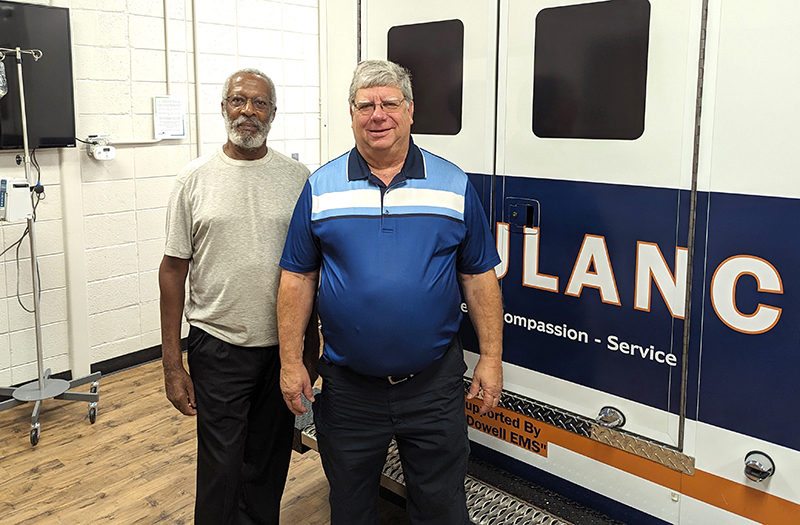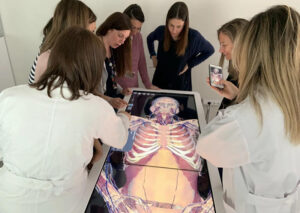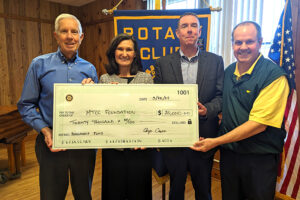Following a lengthy planning process, McDowell Technical Community College’s Emergency Medical Services Paramedic Program was recently accredited by the Committee on Accreditation for Emergency Medical Science Professions (CoAEMSP), in conjunction with the Commission on the Accreditation of Allied Health Education Programs (CAAHEP). The college’s final site visit for accreditation had originally been scheduled for 2020, but the COVID Pandemic created an enormous backlog which resulted in the site visit being delayed until earlier this year.
Having an accredited program assures prospective students and employers that McDowell Tech’s Paramedic and upper-level EMS programs have met or exceeded national training standards. It also gives students a portable credential, making it easier for them transition to positions in other states or jurisdictions. Several of McDowell Tech’s paramedic students, for example, are now employed as part of emergency services helicopter crews in North Carolina, South Carolina, Georgia, Virginia and Tennessee. Because of the accreditation, new graduates will find it even easier to obtain employment throughout the Southeastern United States, as well as elsewhere in North Carolina.

“We are very proud of the hard work our faculty and staff have put into making this happen,” said Ryan Garrison, MTCC Interim President. “Our faculty had already been holding our graduates to the highest academic standards, but Eugene Edwards, who directs our public safety programs, and his staff put in countless hours documenting for the accreditation committee that we did indeed meet their rigorous standards.”
Having this accreditation has become so important that the Office of Emergency Medical Services in North Carolina now requires accreditation for paramedic training programs. Like McDowell Tech, some programs had operated under a letter of review for the last few years, pending delayed site visits from CoAEMSP.
During the accreditation process, the review committee from CoAEMSP assessed not only the college’s curriculum standards, but retention and attrition rates, how well the college’s paramedic graduates performed on state and national-level certification exams, how the college tracks student success and progress, among many other issues.
The Folks Who Made It Happen
Besides Edwards, several individuals have been key to the success of McDowell Tech’s EMS graduates and the accreditation of the EMS program. William Kehler, Emergency Services Director for McDowell County, manages EMT Training for McDowell Tech. He also serves on the college’s board of trustees. Dr. Edward St. Bernard, a local physician specializing in Internal Medicine and Pulmonology, is the college’s medical director for EMS programs. He has also worked with McDowell EMS at the county level for approximately 25 years.
“This county is known for going the extra mile to ensure the quality of graduates is as good as it can be,” said Dr. St. Bernard. “Even the state says that when they come to this place.”
In fact, “…the accreditation process hasn’t resulted in a whole lot of change,” he said. “The (accreditation) process allows things to be more streamlined, but overall, the education that was provided is about the same.”
In addition to oversight by Edwards and instructional staff, students in the paramedic program spend at least one day during their training program working with Dr. St. Bernard at his medical office, and St. Bernard is part of the final testing process for students, and he runs through emergency medical scenarios with them from time-to-time. “It’s like a sign-off that they have what it takes to be competent paramedics. We look at not just what they say, but whole patterns of behavior—their clarity of thought, calmness, and their ability to adjust or adapt to new information or circumstances, for example.”
High-Quality Instruction and Administration
Just as the college went through a rigorous review process to complete accreditation, St. Bernard suggested that colleges, both locally and nationwide, should rethink or relook at the process of hiring teachers who work in emergency services training. “The pay we offer doesn’t attract a lot of people to teaching, and if we want to continue to improve, we have to offer pay that attracts highly qualified instructors,” he said.
Fortunately, McDowell Tech has been fortunate to draw a highly-qualified group of instructional staff and administrators by partnering with McDowell EMS and hiring many of their seasoned staff to provide classroom and clinical instruction on a part-time basis, or by hiring well-qualified recent retirees.
Edwards, for example, began working for the college while still an employee at McDowell EMS, where he had worked since 1984. Prior to his retirement, Edwards served as Deputy Director of Emergency Medical Services for McDowell County. He has been a National Registry Paramedic since 2003, is a NC State Paramedic, and has previously been designated as a Critical Care Adult and Neonatal/Pediatric Paramedic. In addition to his EMT and Paramedic training, he holds a bachelor of science in both nursing and emergency medical science from Western Carolina University and a master’s degree in nurse practitioner studies from Walden University. He is a certified as a nurse practitioner in North Carolina and also works part-time at Blue Ridge Healthcare in Morganton and Marion.
Edwards was recently recognized by the National Registry of Emergency Medical Technicians for achieving 20 consecutive years of National EMS Certification. This distinction is an honor held by few EMS professionals.
To maintain his status as a Nationally Registered Paramedic, Edwards completed, on a biennial basis, the most comprehensive recertification program for EMS professionals in America. By maintaining his National EMS Certification and completing regular continuing education courses, Edwards has demonstrated his commitment to providing exceptional prehospital emergency medical care.
“For me, EMS work is fulfilling and rewarding, primarily because it allows us to help people at some of the most critical periods in their life,” said Edwards. “We see people on the worst day of their lives, sometimes, and bring organization out of what is sometimes total chaos.”
Paramedic Classes
McDowell Tech’s next EMT class, the first step to becoming a paramedic, will begin in January. The next paramedic class will begin next August. The EMT and Advanced EMT programs are one semester each, while the paramedic program is 4 semesters long. Students who want to complete a full associate’s degree in Emergency Medical Science after completing the paramedic program only need 9 additional classes to complete that program.
“Congratulations to Eugene, William Kehler and Dr. St. Bernard and all of our faculty and staff on achieving national certification for the paramedic program,” said Garrison. “While we hate to hear of sometimes life-threatening medical emergencies that occur all too frequently, I am relieved to know that most of our local paramedics received their training at McDowell Tech and are among the most highly qualified and dedicated medical professions anywhere in the country.”
To learn more about the paramedic program, contact Edwards at [email protected] or visit https://mcdowelltech.edu/academic-degree-programs/public-safety-training/ems-aha-programs/ .



